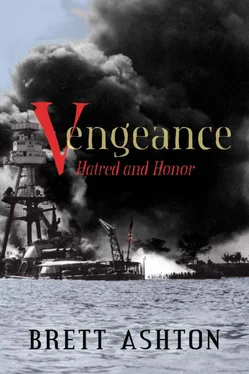“My wife and son are over there,” I said to the Lieutenant as I watched the flaming debris from the ship rain down over Hospital Point.
“I know that, sir.”
“Chuck,” I said after a brief pause “from here to the ends of Hell itself, I swear I am going to kill as many of those slant-eyed bastards as I can.” And with that, the purpose I used to survive the attack grew into the purpose I used to fight a war.
I still remember the first time I heard the “Day of Infamy” speech the president gave to Congress, asking for war. It was almost required listening at the time for anybody not on an immediate life-saving rescue operation. Since I was still on light duty from my injuries sustained the day before, it was easy enough to be near a radio when it happened. News was the big occupier of time for those of us in good enough condition to listen to it, and the medics were willing to provide us with a radio to keep us “less wounded” busy and out of their hair. We were starving for information about what was going on and would stop at nothing to get it.
By then, the big flood of casualties had tapered off quite a bit, but the medical personnel were still going strong on the ones who were there. There was plenty enough misery, pain, and death to go around. The dead were piled up and covered with blankets outside to make room inside for the living who still needed treatment. The sound of patients moaning or occasionally screaming in pain was all around us, which had an emotional, amplifying effect on those of us who were listening to the speech. It’s one thing to listen to that speech in a nice quiet place like home, fifty or sixty years after the fact, but another thing entirely when you are surrounded by the products of the war the president was speaking of.
The room was full of people I didn’t know, as well as some of the other officers and crew of the Oklahoma . But we were all bound by the same experience and the same purpose. We were all in it together and knew it, which gave us a unity in spite of the fact we didn’t personally know each other.
Everybody had a good idea of what was going to happen when the president began to speak. Nobody in the room made a sound. We were as one, bound to the radio, silent and waiting for the words we knew were coming to finally arrive.
Most people these days remember the “A date which will live in infamy” line but know very little else of what he said. Thus, history has decided to title it “The Day of Infamy” speech.
Not that he said a lot in addition to that; he didn’t need to. This was plain. The whole thing was little more than six minutes long. But man, I tell you, he hit this one right out of the park in a way the Babe never could.
The parts which really stood out to us the most were toward the end. “I believe that I interpret the will of the Congress and of the People when I assert that we will not only defend ourselves to the uttermost but will make it very certain that this form of treachery shall never again endanger us.” There was a loud round of applause from Congress, but we remained silent.
“No matter how long it may take us to overcome this premeditated invasion, the American people in their righteous might will win through to absolute victory.” Applause again from Congress, and we still remained silent.
“With confidence in our armed forces—with the unbounding determination of our people—we will gain the inevitable triumph—so help us God.” Applause once more from Congress, and some of us began to nod in approval. I began to feel myself smile a little bit in spite of it all.
“I ask that the Congress declare that since the unprovoked and dastardly attack by Japan on Sunday, December 7th, 1941, a state of war has existed between the United States and the Japanese Empire.”
The applause again echoed through the halls of Congress, but the dispensary at Ford Island was still fairly silent except for the moans from the wounded. We all exchanged looks at each other, each man singularly weighing the ramifications of what the Commander in Chief had just said and coming to the same conclusions. All of us were in bandages or casts, some of us still in tattered uniforms covered in oil. And we remained silent for almost a minute until one of us broke the silence and said softly, “That’s it, boys; we’re at war.” We all knew what it meant. The days of practice and drilling were over; the days of ass-kicking had begun. The president of the United States had just given us the license to kill.
And kill we did.
The Enterprise and its escorts were in Pearl Harbor the day after the attack. The admiral in charge of the task force, Admiral William “Bull” Halsey, who later became somewhat famous, saw the destruction and said, “Before we’re done with them, the Japanese language will be spoken only in Hell.” And once that quote started to get around, people began to come out of their shocked stupor to rally to the cause. And just as if to set an example, his ships were resupplied, refueled, and back out to sea in pursuit of the Japanese fleet within eight hours.
It took me quite awhile after the attack to get a message to Susan to let her know I was alright. It’s a funny thing because the whole time she was wondering if I was okay, I was wondering the same about her. We were not very unique in that. Thousands, perhaps tens of thousands of families across the country were wondering the same thing about their family members. The communication lines over the islands were very chaotic and confused. I tried to force myself to believe she would be okay because the hospital didn’t seem to be a target to the Japanese. On the other hand, there was that Jap airplane crash, not to mention stray bullets, bombs, and our own anti-aircraft shells raining down everywhere. You just couldn’t be sure because nobody was completely safe, whether they were a target or not.
She was greatly relieved to hear I had survived with only slight injuries, but didn’t bother to mention that she had got some stitches in her left forearm herself. One of the explosions sent a piece of shrapnel through the window she was near while she was helping one of the many burn victims, and the glass cut her arm.
I can’t imagine what it was like for her during that time. I mean, I could see the hospital was intact and relatively undamaged, but from the hospital, she could look across the harbor and see the overturned hull of the Oklahoma surrounded by burning fuel oil. I could well afford to speculate that she was alright, but there was no possible way she could do the same about me.
It turned out she was doing just what I thought she would be doing, helping other patients who came in during and after the attack. I knew she just couldn’t stay down.
One of the more difficult decisions I had to make was what to do with my wife and kids after the attack. Seeing that we were at war and Pearl Harbor had already been attacked once, we decided it would be best if she went stateside with the kids to stay with her parents on their farm in Ohio. And so a month later, they were gone.
We missed each other terribly over the next four years, but that is just one of the parts of being at war. A lot of people stayed in Hawaii—far more than I expected. Different situations I suppose, and a lot of people were spoiling for another showdown with the Japs. But for me, I fully expected, accurately as it turned out, that I would be spending almost all of it at sea anyway and couldn’t see the need to keep them in a place that might be attacked again.
A lot of the displaced officers and crews of the ships that were sunk during the attack suddenly found themselves working cleanup and salvage operations until they got reassigned. It was dirty, hard, and disgusting work. There was plenty of evidence of the struggle of some of the people who didn’t survive the attack.
Читать дальше












